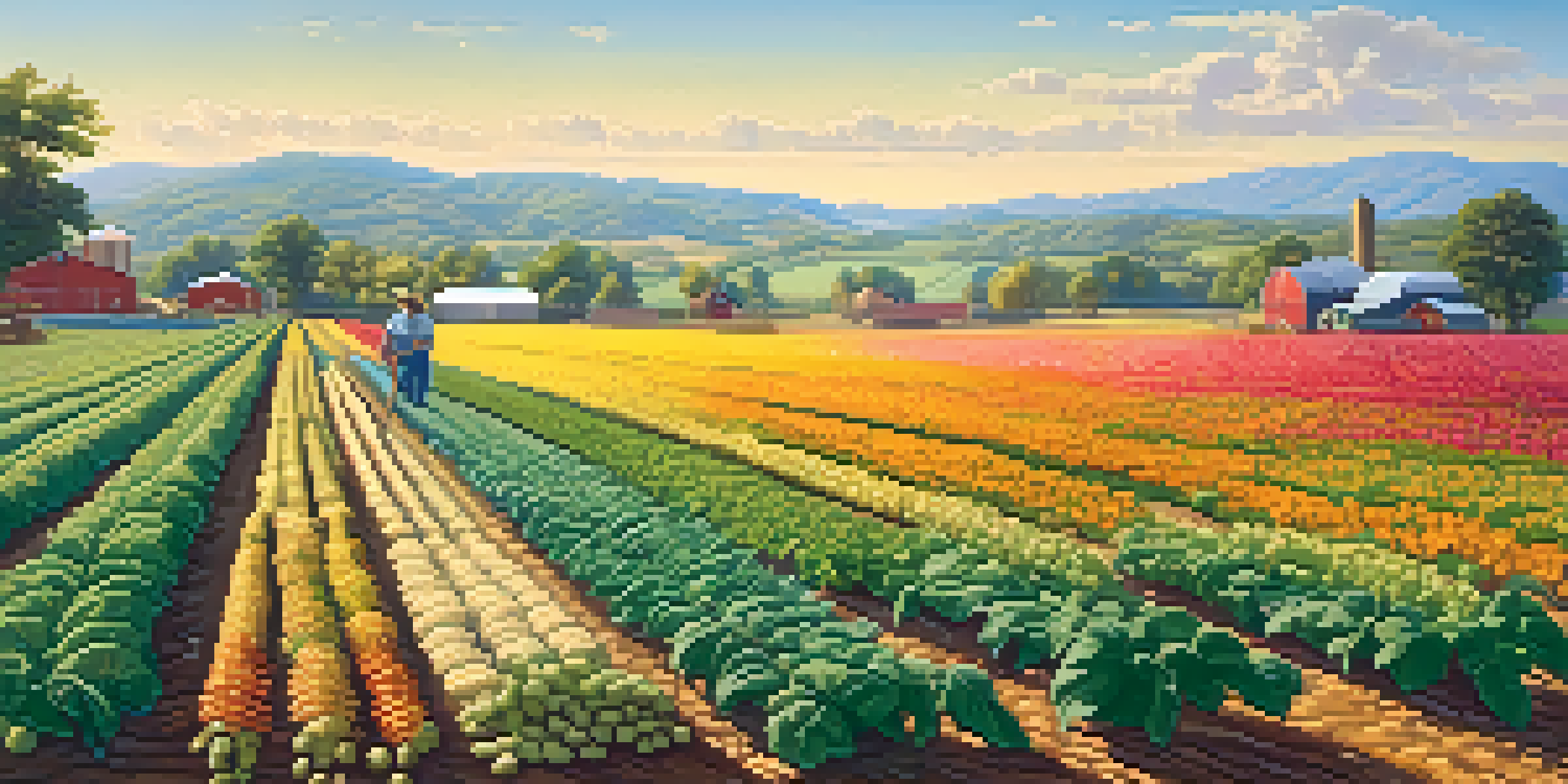The Importance of Crop Diversity in Georgia's Agriculture

What is Crop Diversity and Why Does It Matter?
Crop diversity refers to the variety of crops grown in a particular area, which can include different species, varieties, and genetic traits. This diversity is crucial because it helps to create a balanced ecosystem that supports various forms of life, from soil microorganisms to pollinators. When farmers grow a mix of crops, they can better withstand pests, diseases, and changing environmental conditions.
Agriculture is the foundation of our civilization, and it must be treated as such. Crop diversity is essential for sustainable food production.
In Georgia, a state known for its rich agricultural landscape, crop diversity means more than just increasing the number of different plants in the field. It also involves selecting crops that can thrive in the local climate and soil conditions. For instance, mixing cotton with peanuts and soybeans can improve soil health and reduce the risk of crop failure due to disease.
Moreover, crop diversity contributes to food security by providing a broader range of food options. This is essential for local communities, as it ensures that there are multiple sources of nutrition and income, supporting both farmers and consumers alike.
Benefits of Crop Diversity for Soil Health
One of the most significant advantages of crop diversity is its positive impact on soil health. Different plants have varying root structures and nutrient needs, which helps to prevent soil depletion. For example, deep-rooted crops can draw nutrients from deeper layers of soil, making them available for shallower-rooted plants.

Additionally, diverse cropping systems can enhance soil microbial activity, which is essential for nutrient cycling. Healthy soil microorganisms break down organic matter and improve soil structure, leading to better water retention and reduced erosion. This, in turn, creates a more resilient and productive agricultural system.
Crop Diversity Supports Ecosystems
A variety of crops promotes a balanced ecosystem, enhances soil health, and contributes to food security.
Farmers can also utilize cover crops, like clover or rye, which not only add diversity but also protect the soil during off-seasons. These crops help prevent erosion and can even fix nitrogen in the soil, reducing the need for chemical fertilizers.
Enhancing Pest and Disease Resistance through Diversity
Crop diversity plays a vital role in pest and disease management. When farmers plant a variety of crops, it creates a more complex ecosystem, making it harder for pests and diseases to spread. For instance, if a pest targets a specific crop, diverse planting can limit its food sources, ultimately reducing its population.
Biodiversity is not just a luxury; it is a necessity for our survival. Diverse crops provide the resilience we need in an uncertain climate.
Moreover, certain plants can repel pests or attract beneficial insects, acting as natural pest control. For example, marigolds are known to deter nematodes, which can be harmful to crops. By incorporating such companion plants, farmers can enhance their crop yields without relying heavily on chemical pesticides.
This approach not only protects crops but also promotes a healthier environment. By minimizing chemical inputs, Georgia farmers can contribute to a more sustainable agricultural system that benefits both the land and the local community.
Improving Resilience to Climate Change
As climate change continues to impact agriculture, crop diversity offers a crucial buffer against its effects. With unpredictable weather patterns, such as droughts or floods, relying on a single crop can be risky. However, a diverse cropping system can provide options for farmers to adapt to changing conditions.
For instance, if a drought affects corn production, farmers who also grow drought-resistant crops like sorghum may still have a viable harvest. This not only secures their income but also helps stabilize local food supplies during challenging times.
Resilience Against Climate Change
Diverse cropping systems provide farmers with options to adapt to unpredictable weather patterns and climate extremes.
Additionally, diverse crop systems can improve water management and reduce the overall impact of severe weather events. By planting a mix of crops, farmers can enhance soil moisture retention and promote healthier ecosystems that are better equipped to cope with climate extremes.
Economic Advantages of Crop Diversity
Crop diversity can lead to significant economic benefits for farmers. By diversifying their crops, farmers can tap into different markets and reduce their dependence on a single crop. For example, a farmer who grows both vegetables and grains can sell fresh produce at local farmers' markets while also supplying grain to larger distributors.
This strategy can help stabilize income, especially during years when one crop may not perform well. Moreover, in a state like Georgia, where agriculture is a major economic driver, diverse crop systems can attract new buyers and boost local economies.
Additionally, crop diversity can reduce input costs. By rotating different crops, farmers can naturally manage pests and diseases, lowering the need for pesticides and fertilizers. This not only saves money but also promotes environmentally friendly farming practices.
Cultural Significance of Diverse Crops in Georgia
The cultural significance of crop diversity in Georgia goes beyond economics and environmental benefits. Many communities have deep-rooted traditions associated with specific crops, such as peaches and pecans, which are not only vital for local cuisine but also hold historical importance. Maintaining diverse crops ensures that these traditions continue to thrive.
Moreover, crop diversity fosters community resilience. Local farmers markets, where diverse produce is sold, create spaces for community interaction and connection. These markets not only support local economies but also promote awareness about the importance of sustainable practices.
Economic Benefits for Farmers
By diversifying crops, farmers can access different markets, stabilize income, and reduce input costs.
By celebrating diverse crops, Georgia can preserve its agricultural heritage while also adapting to modern agricultural challenges. This blend of old and new is essential for creating a sustainable future for the state's agriculture.
Strategies for Promoting Crop Diversity
Promoting crop diversity in Georgia requires a concerted effort from farmers, policymakers, and educational institutions. Farmers can start by experimenting with different crop rotations and incorporating cover crops into their practices. Workshops and training programs can equip them with the knowledge needed to diversify effectively.
On a broader level, local governments and agricultural organizations can support initiatives that incentivize farmers to adopt diverse cropping practices. This might include grants or subsidies for planting cover crops or funding research on climate-resilient varieties.

Additionally, community engagement is key. Encouraging consumers to support local farmers who practice crop diversity can help drive demand for a wider range of products, creating a healthier agricultural landscape for everyone.